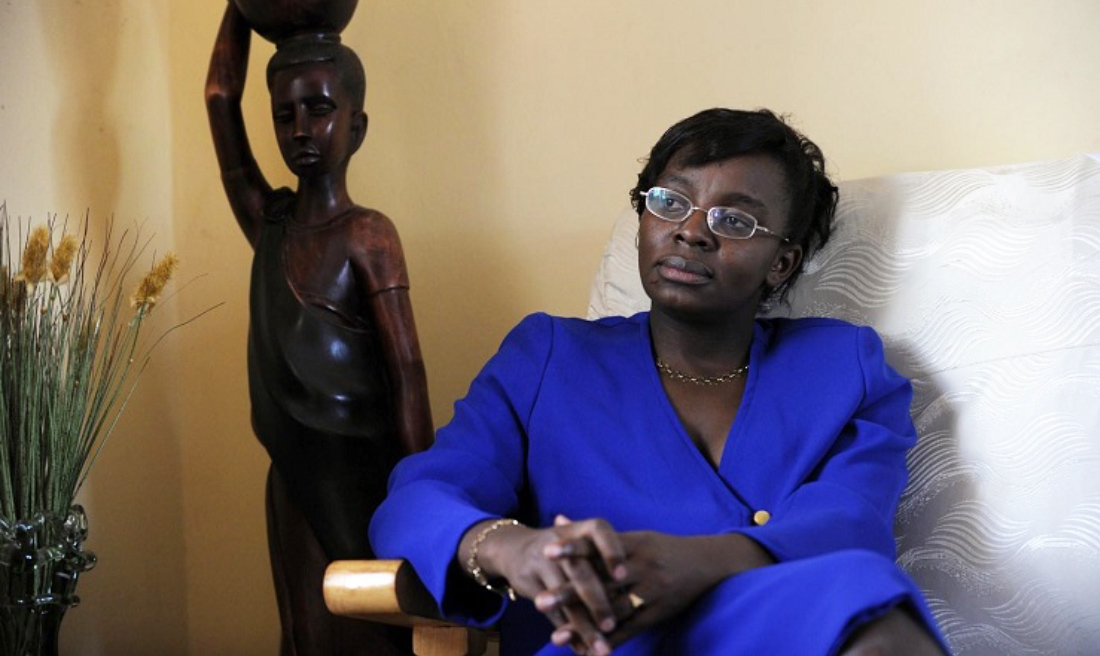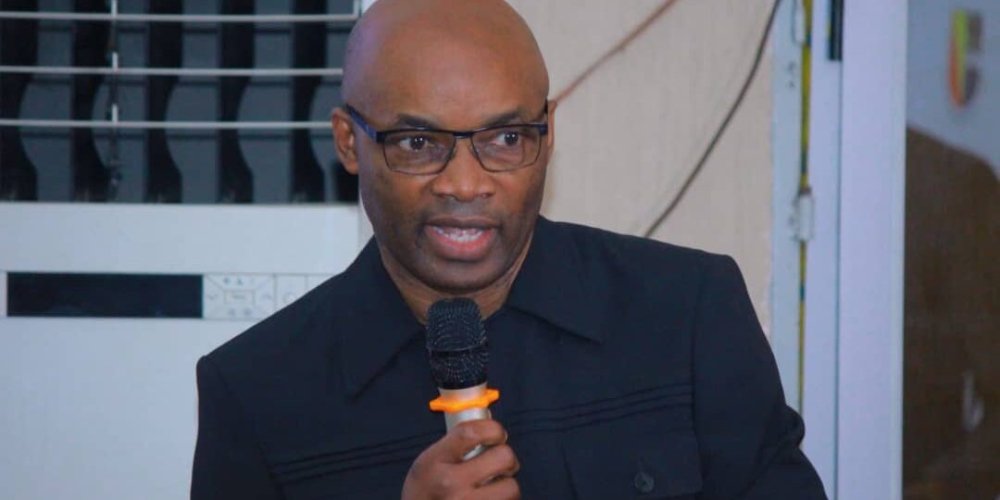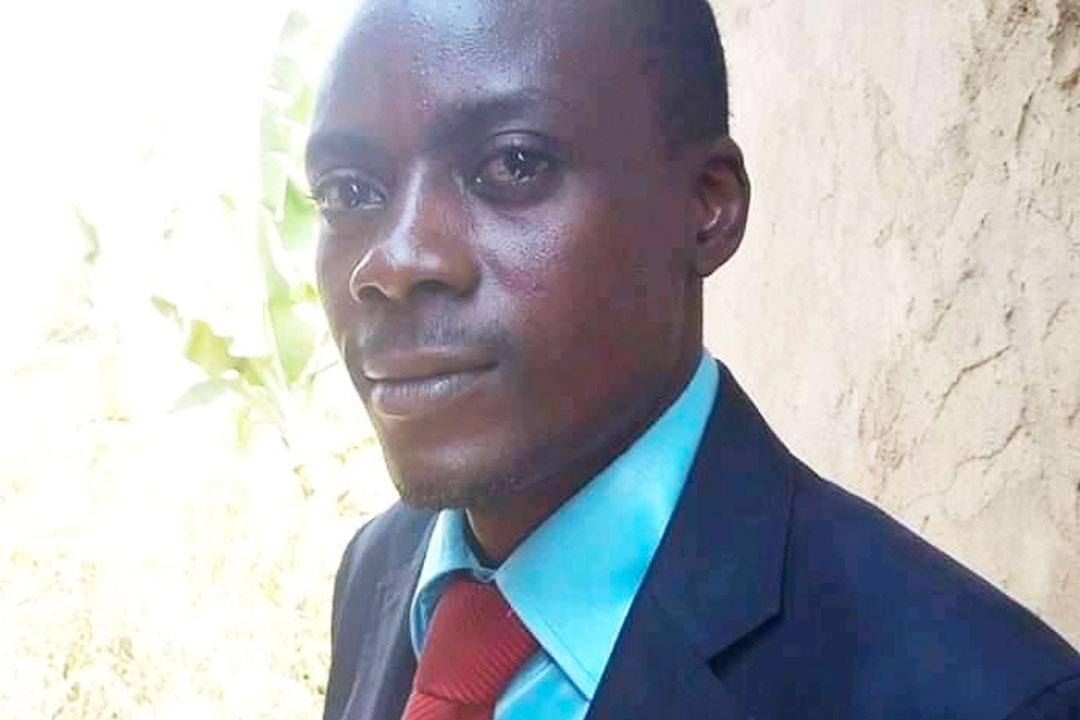On Saturday 13 June, the Rwanda investigation Bureau (RIB) carried out a search at the home of Victoire Ingabire Umuhoza, a political opponent of the Rwandan Patriotic Front (RPF), Rwanda’s ruling party.
The aim of the search was to find evidence that Mrs Ingabire has links to armed groups. RIB’s spokesperson said the search was triggered by revelations from a person who was caught trying to flee Rwanda to join the aforementioned groups. That person is a government official at the Rwandan ministry of education and a representative of RPF in one of the districts of Kigali.
RIB has seized all Victoire’s communication equipment and documents – including her past court hearing papers – as well as money.
On Wednesday 16 June she was called in for interrogation at RIB and returned for more questioning on Friday 19 June.
Corrupt institutions
Involvement in armed groups or having intent to destabilise the country are common allegations that the RIB uses to arrest any person who publicly opposes the ruling regime in Rwanda. These same accusations were used against Mrs Ingabire when she announced her intention to run in the 2010 presidential election. She was convicted by Rwanda’s judicial courts and sentenced to eight years’ imprisonment. Mrs Ingabire was cleared of any wrongdoing by the African Court of Human and Peoples’ Rights in 2017.
Other dissidents have been accused of similar crimes. Diane Rwigara was also dragged into court for inciting insurrection and forgery after having publicly expressed her wish to stand in the presidential elections in 2017. She was acquitted by Rwandan court after presidential election took place. Kizito Mihigo was a popular and talented gospel musician whose song, “The Meaning of Death”, was seen as challenging the officially accepted version that only victims of the genocide against the tutsis should be honoured. In his song, kizito sang that he also remembers those whose killing was not called genocide. According to the Rwandan authorities, Kizito was arrested because he was caught trying to join armed groups in a neighbouring country. He was found dead in a police custody few days after he was arrested. The authorities claimed Mr Kizito committed suicide but many believed he was executed. He was mourned by a lot of Rwandans and foreigners on the African, European and American continents.
The allegations brought against those who dare to oppose the RPF regime in Rwanda are well known by citizens and the international community. There is no need to waste time elaborating on the deceit and abuse of power by those who supposedly uphold law and order in Rwanda.
Nonetheless, Mrs Victoire is the victim of her own exceptional bravery and resilience. These qualities have been shown as she tries to bring the current regime in Rwanda to reason over the period preceding, during and after her imprisonment. These have gained her popularity and sympathy as an extraordinary woman who wants to bring change in Rwanda which the regime in Rwanda known for not tolerating critics find it hard to digest.
A brave woman
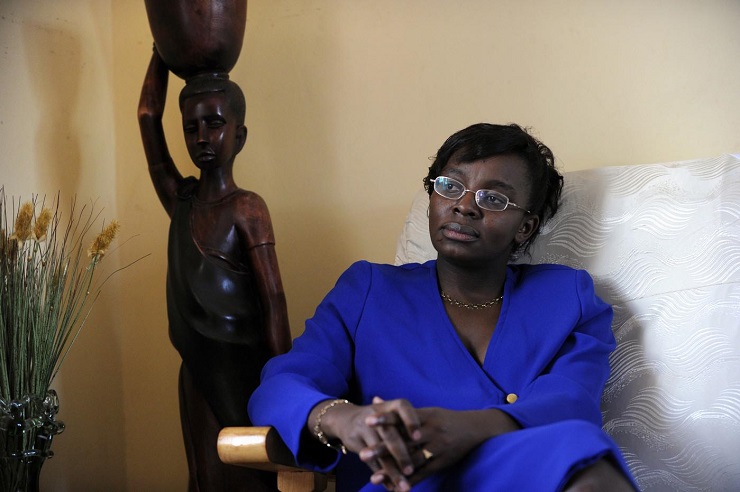
In January 2010, Mrs Ingabire made the decision to leave her family, a promising career and the comfort that comes with it, in the Netherlands and return to her beloved native country, Rwanda. She intended to register the United Democratic Forces (FDU-Inkingi), a political party she was the chairperson, and to contest in the 2010 presidential elections.
At the time, her decision was viewed by many as dangerous and futile, considering Rwanda was being run by an authoritarian regime. However, Mrs Ingabire still affirms that she made the right decision to return and do politics in Rwanda. She was ready to confront whatever the authoritarian regime in Kigali put on her.
As soon as she arrived in Rwanda, Mrs Ingabire was accused of numerous charges. These included spreading the ideology of genocide, aiding and abetting terrorism, undermining the internal security of the State, establishing an armed branch of a rebel movement, attempting terrorism and any form of violence to destabilise authority, and violating constitutional principles. Mrs Ingabire was drawn into court trials which were condemned by human rights organisations and the European Parliament. Rwanda’s High Court sentenced her to eight years imprisonment. When she appealed to the Supreme Court, the sentence was extended to 15 years.
Putting Mrs Ingabire in jail was perhaps the best solution the authoritarian regime had figured out. However, due to the injustice suffered at the hands of the very same regime and her courage in confronting the most feared dictatorial regime on the African continent and beyond, Mrs Ingabire’s profile gradually rose.
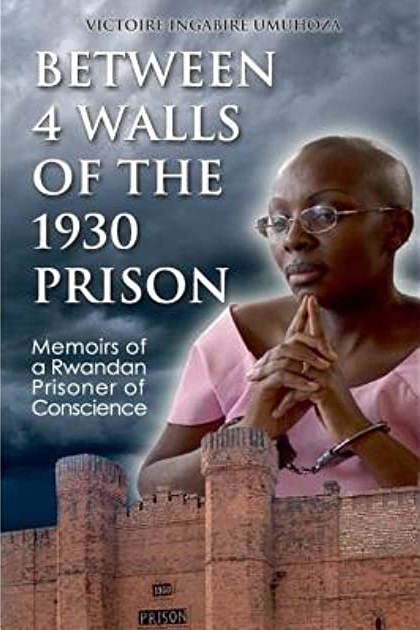
In September 2012, while still in prison, Mrs Ingabire was nominated by 42 members of the European Parliament for the Sakharov Prize for Freedom of Thought for that year. The Sakharov Prize honours individuals and groups who have dedicated their lives to the defence of human rights and freedom of thought. In September 2017, while still in prison, Mrs Ingabire published a book titled “Between Four Walls of 1930 Prison”, in which she recounts her return to Rwanda, the trial and her subsequent imprisonment, as well as her thoughts and beliefs.
Believing she would not get a fair trial in Rwanda, Mrs Ingabire organised for an appeal to the African Court of Human and Peoples’ Rights (AfCHPR). As her case was pending before the AfCHPR, the authoritarian regime in Rwanda tried to act against her by withdrawing Rwanda’s declaration allowing individuals to appeal directly to the AfCHPR. However, this did not affect Ingabire’s case.
In November 2017, the AfCHPR held that Rwanda had violated Victoire Ingabire Umuhoza’s right to freedom of opinion and expression, as well as her right to an adequate defence. The African court also ruled that the government should pay compensation to Mrs Ingabire for damages she and her family endured while she was in prison.
In September 2018, the current president of Rwanda exercised his prerogative of mercy and granted early release to Mrs Ingabire. It is unknown whether the presidential pardon given to Mrs Ingabire was the result of intense external pressure exercised on the Rwandan government, or from genuine compassion the Rwandan president had for her.
Nonetheless, before and during her imprisonment, Mrs Ingabire‘s attitude and actions have been so outstanding that it is fair to say she won the battle against the regime in Rwanda as she exposed the RPF regime’s true colours worldwide. Today it is widely believed that the accusations brought against Mrs Ingabire were politically motivated, the judicial system in Rwanda is corrupt and the incumbent leadership in Rwanda is yet another African authoritarian regime that wants to cling on to power.
Victoire reflects undeniable resilience
Straight after Victoire’s release, a string of attacks on opposition figures took place, resulting in the mysterious death and disappearance of key members of Victoire’s political party. In October 2018, Boniface Twagirimana, the deputy leader of the FDU-Inkingi, went missing while in a high-security prison. In March 2019, Anselme Mutuyimana, Victoire’s assistant, was found dead by strangulation. In July 2019, Eugene Ndereyimana, an FDU-Inkingi member, went missing. In September 2019, Syldio Dusabumuremyi, national coordinator for FDU-Inkingi, was stabbed to death by two unidentified men. In May 2020, Théophile Ntirutwa, a member of Ingabire’s party member, survived an assassination attempt. However his neighbour, Théoneste Bapfakurera was killed in the attack. Early in June 2020, Venant Abayisenga, Victoire Ingabire’s right-hand men left his house to buy some mobile units and he hasn’t been seen since. RIB is yet to announce any findings on these incidents.
Mrs Ingabire has condemned these acts. She believes they are attempts to discourage her in her struggle to bring about democracy in Rwanda.
In November 2019, Victoire resigned from FDU-Inkingi and launched a new political party named Development And Liberty For All (DALFA-Umurinzi).
The main reasons for Victoire’s resignation were that the FDU’s main focus is the establishment of democracy and respect for human rights in Rwanda; however, it is operating in exile, far from the life experience of many Rwandans. Victoire’s newly launched political party, DALFA-Umurinzi, is based in Rwanda. DALFA-Umurinzi focuses on bringing about sustainable development to Rwandans, an objective that Mrs Ingabire says cannot be achieved without installing democracy and respect for human rights in Rwanda. Nonetheless DALFA-Umurinzi is yet to be authorised and approved as a political party by the authorities in Rwanda.
In spite of all hurdles she encounters, Mrs Ingabire’s struggle continues to draw the attention of the international community. In December 2019, the Association for Human Rights of Spain (APDHE) awarded her the 2019 Human Rights Award. The Rwandan government would not allow her to attend the award ceremony in Spain.

Using the right to freedom of expression given to citizens under article 38 of Rwanda’s constitution, in December 2019 Mrs Inbagire published a report that analyses the development programme launched in 2000 by the RPF. Entitled “Rwanda Vision 2020 development programme’s scrutiny: a comprehensive analysis that challenges Rwanda development miracle narrative and calls for change”, the report is the first ever compiled and published by a dissident on Rwandan soil. None of the opposition parties having a seat in the parliament in Rwanda have ever dared to produce and publish anything of this nature.
Vision 2020 was a development programme launched by the current president of Rwanda in 2000. The programme promised to transform Rwanda from a low- to middle-income country driven by a knowledge economy, by 2020. In her report Mrs Victoire demonstrates that Vision 2020 has not been achieved and explains the reasons for this.
Giving concrete examples, Mrs Ingabire points out indicators of the Vision 2020 development programme that are yet to be met, such as the GDP per capita that is yet to reach the target of US$1,240. She also challenges the Vision 2020 targets that the current government claims to have achieved, but which can be challenged. One example of this is the life expectancy target of 66 years, which is reduced by 20% due to inequality in Rwanda.
Mrs Victoire’s report also illustrates that the government is yet to reach the objectives set out in its Vision 2020 development programme’s pillars and related cross-cutting issues. She does this by providing figures and facts, confirming that the RPF is yet to deliver good governance in Rwanda. Thus it has so far failed to deliver promised human capital, private sector, infrastructure and agriculture development. It has failed to provide an environment for Rwanda to effectively integrate regionally and internationally, as had been promised in the Vision 2020 programme.
Mrs Ingabire argues that the ruling party has used its power to stifle any genuine political opposition and reject any critical judgement on its governance and development policies. As a result, new and severe challenges that will have dire repercussions for Rwanda’s economy outlook have materialised, as the Vision 2020 objectives were being pursued. Among these dire challenges are the country’s rising debts, inequality, youth unemployment and happiness deficits.

On her Twitter account, where she regularly posts videos promoting her report on the Rwanda Vision 2020 development programme, Mrs Ingabire has clarified that the main reason the Vision 2020 development programme has not been achieved is lack of efficient governance in Rwanda.
Mrs Ingabire proposes building strong pillars of democracy in Rwanda and explains the ingredients for this to be achieved. She also indicates the actions different stakeholders in the development of Rwanda can do to advance good governance for sustainable development in Rwanda. Mrs Ingabire underlines the need for a working group made up of government and opposition representatives as well as members of civil society to discuss in detail her proposal.
Mrs Ingabire has also been speaking out for citizens marginalised by the state for various reasons. She publicly condemned the forceful demolition by the State of residents’ houses in 2019 and 2020. She was also heard on international radio speaking against the Rwandan government’s unconstitutional and illegal expropriation of part of public workers’ salaries, under the pretext of investing this money in the national healthcare insurance scheme.
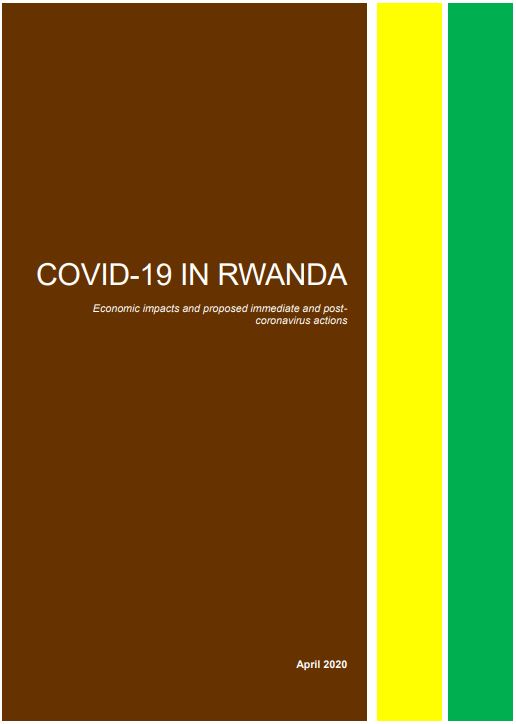
Since coronavirus reached Rwanda, Mrs Victoire has regularly been heard on local YouTube channels calling for calm and solidarity among Rwanda’s population. During her many interviews undertaken on the coronavirus crisis, she suggested immediate actions the government could take to improve the coronavirus situation in Rwanda. In April 2020, she acted ahead of the government and opposition political parties which have seats in the Rwandan parliament, and released a report that offered her perspective on the economic impacts of COVID-19 in Rwanda, as well as proposed immediate and post-pandemic actions to reanimate the country’s economy. The insights provided in her reports and interviews are evidence that Mrs Ingabire grasps Rwanda’s problems and has practical solutions to solve them. These have gradually gained her popularity to the extent that those who were initially sceptical towards her are now joining her. This is Mrs Ingabire’s only crime.
Mrs Ingabire’s bravery and resilience have made her an icon for change in Rwanda among the country’s citizens. This is also partly thanks to the regime in Rwanda continuous actions to persecute her. No oppression nor coercion will deter her, but will instead encourage her towards her struggle to bringing about democracy in Rwanda. Rather than tormenting her and working its fingers to the bone to prevent Mrs Ingabire expressing her views, the regime in Rwanda would better approve her political party to operate in the country. Otherwise, her bravery and resilience will surely remain an embarrassment and a challenge to the RPF regime.
Author name: AMS

